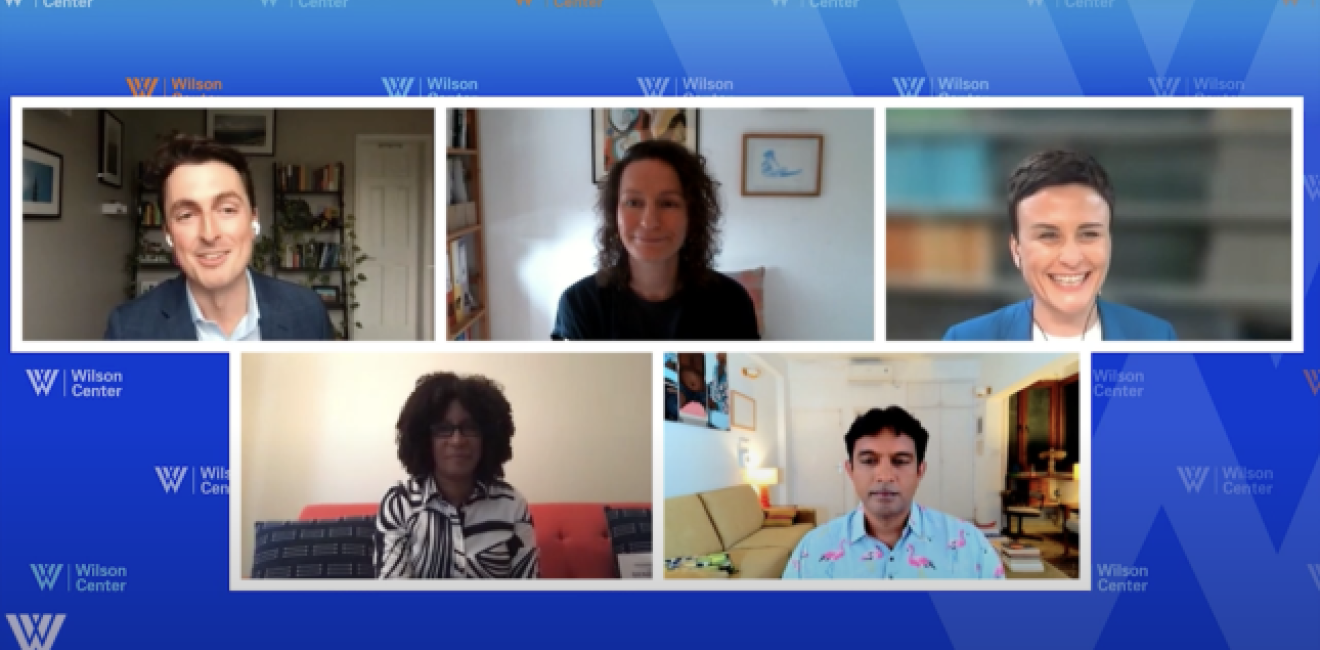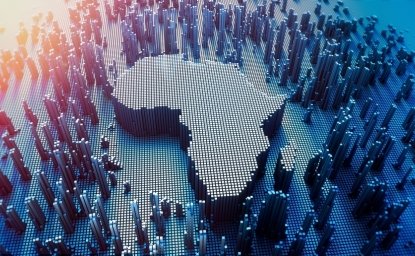As the COVID-19 pandemic gripped the world in late 2019 and early 2020, the world’s great hope was in the rapid development and deployment of vaccines. Global public health organizations hoped to seize upon the crisis to advance international cooperative efforts to fight COVID-19, and the promise of advanced economies embracing “vaccine diplomacy” to get shots into arms around the planet was a key element in this strategy.
Vaccine diplomacy’s promise was unfulfilled in many ways, including challenges with production and intellectual property. Yet the role of competing political values and approaches may have been the most important factor, and a Wilson Center event in June 2022 convened experts to explore the issue through the lens of strategic competition.
Presenters at the panel sought to address continuity and change in global health policies over time, as well as explore new vaccine diplomacy strategies driven by global pandemic magnitude, scale, and competitive spirit. Before COVID-19 swept the planet, Western views dominated vaccine diplomacy. Researchers saw it either as a part of global health diplomacy, or as informal diplomacy rooted in an altruistic effort by vaccine-producing countries which had previously worked together to quell other major world diseases.
Yet political strategies around COVID-19 vaccines were extremely diverse. Vaccine diplomacy is a complex phenomenon that influences health and medical aid, development politics, national security interests, domestic and foreign policy strategies, and public-private cooperation. With the growth of national interests during the pandemic, vaccine diplomacy primarily mirrored state national interests. Vaccines were seen as a medical product and a political tool.
One of the paradoxes at the center of the discussion is both clear and somewhat unexpected: “The countries with the most closed governments [China, Russia, Cuba] created the most open vaccines. Who did not behave like a great power? The U.S. and Europe, who developed the best technology in the pandemic, the mRNA vaccine,” said Achal Prabhala, coordinator of the AccessIBSA Project.
Competition Over Collaboration
For decades, public health leaders and scientists have seen health care as the most affordable and trustworthy area for diplomacy and state foreign affairs. And for good reason. Public health is a universally understood value that is enshrined in international law and in human rights frameworks. It also has emerged as a central feature of development policy. In a world where collective vulnerability and collective responsibility are intertwined in so many ways, there was a political expectation that nations would unite around global health imperatives.
Yet in global health and international affairs, the COVID-19 pandemic became the equivalent of a “margin call” in the stock exchange. The “old international order is gone,” declared co-authors Colin Kahl and Thomas Wright in their analysis of the future of international relations during the pandemic, while emphasizing that the “era of the great-power cooperation is over.” Historian Adam Tooze argued that the crisis has caused the “death of the orthodoxy [neoliberalism]”—dethroning it from its place as a coherent ideology of government that had prevailed in economic and development policies since the 1980s.
How did this shift affect vaccine policy—and the use of vaccines as a form of diplomacy?
First, there was the sheer scale and intensity of the effort. The race to find an effective vaccine was joined by almost every major global power. The accelerated rollout of these vaccines brought hope—but also created a new geopolitical dynamic of overt competition. This competition logic has framed vaccine policies on multiple layers, including development and manufacturing processes, roll out to populations, and attempts to suspend intellectual property rights. It even led some nations to impose sanctions.
Second, it is little surprise that vaccine diplomacy also became a remarkable part of the COVID-19 political narrative, in such an atmosphere. Media depictions of vaccine diplomacy focused on how China, Russia, India, the US, and European Union might use vaccines to assist (and exert influence upon) countries lacking the capacity to develop and produce them. French President Emmanuel Macron even connected it with larger geopolitical struggles, envisioning a “war of influence over vaccines,” and urging Western countries to counter Russian and Chinese vaccine diplomacy in regions such as Africa.
Regional Responses
The focus on state interventions during the COVID-19 pandemic provided a stark contrast with the previous frameworks of global response to such crises, which were based on common rules and international law. Even in democracies, a reassertion of state power combined with deep differences of national interests and strategic rivalry undermined national and global health politics and policy.
This profound shift also affected the role of vaccine development and distribution. At the June event, panelists assessed the impact of both larger changes in global public health infrastructure and growing regional ambitions.
For instance, many low- and middle-income countries did not want to follow the supply-driven vaccine diplomacy approach. They wanted to acquire vaccine technology to localize their own production and manufacturing. “The technology that was developed with federal money in the EU and USA could have been shared with companies in Africa, Latin America, and Asia,” observed Prabhala.
Donna Patterson, a professor of political science and philosophy at the University of Delaware, also pointed to inequities in the infrastructure required to develop and produce vaccines locally. “When you are thinking about COVID-19 vaccines,” she said, “think in terms of regional production. A lot of the pharmaceutical production on the African continent is Western, or Chinese, or others just producing on the continent, but it doesn’t belong to the continent itself. [Even though] the capability to produce pharmaceuticals and vaccines in a few countries—Senegal, South Africa, Morocco, Ghana, Rwanda—already existed.”
The role of philanthropies—and especially their connections to state policies and role in enabling strategic competition—was also central in the discussion. “I see all of this through the lens of financial capital and the relationship between the state, private sector, and financial market with a philanthropy as a for-profit activity around international development,” said Jessica Sklair, Research Fellow, at the Margaret Anstee Center for Global Studies, Newnham College, University of Cambridge. “The problem is the kind of philanthropy we see in Europe and North America is not paralleled in other parts of the world.”
The Future of Vaccine Diplomacy
Already, strategic surveys are revisiting how to meet global challenges created by COVID-19. Any present assessment of vaccine diplomacy must acknowledge that supply is no longer the key issue.
So how do we contemplate vaccine policy moving forward? Three key components stand out: the main actors, policy evidence, and new concepts and definitions.
First, 21st century global health operates in new era of globalization best characterized as a “centrifugal multi-polarity.” And vaccine policy is an area that draws the attention of states, philanthropies, pharmaceutical and biotechnological companies, as well as local communities.
Supranational international organizations—the UN system, Global Alliance for Vaccines and Immunizations (GAVI), the Coalition for Epidemic Preparedness Innovations (CEPI), and others—add further complexities. They function differently than the players described above, creating potential conflicts of interest for states and other actors, as well as overlapping demands that generate layered social, political, and economic challenges.
Policy evidence is a second area worth watching. The vaccine development race sought to leverage existing capacities through an unprecedented government intervention in the pharmaceutical business. The United States, China, Russia, and other nations also relied on public-private partnerships and state-military cooperation to bring together defense personnel, military and scientific capabilities.
Yet there also were notable differences in national policies. Western states prioritized national health goals and relied on multilateral global health mechanisms, but failed to act jointly on vaccine distribution for low-income countries. China and Russia extrapolated their state power into vaccine-related international actions as the pandemic grew—activity that was a stark contrast to their existing global commitments. And though both China and Russia gambled to get up to speed, they did not act jointly. Rather, they used similar bilateral approaches, contacting countries directly offering them varying options and deploying different strategies.
Third, the pandemic also has led to significant changes in concepts and definitions in global public health. And despite immense recent upheavals in world politics, Russia and China independently have created a cascade of precedents. The most important of these might be the alternative bilateral deals created by both nations to bypass bureaucratic delays in multilateral global health structures.
The model of state involvement with vaccine diplomacy offered by China and Russia introduces future implications not only for public health, but also for the broader global political culture. In February 2022, as a part of a joint Xi-Putin statement on global sustainable development, both leaders reframed present concepts of democracy as “sovereign democracy.” While it is not clear exactly what this means yet, it is worth noting that both Xi and Putin adopted the same terminology—and sought perhaps to replace the term “autocracy” with language that emphasizes “sovereignty.”
In any event, China and Russia’s actions and language promises to challenge strain democracies and their leadership in global health and beyond in this new era.
Thinking Differently About Public Health Leadership
COVID-19 challenged the existing architecture of global governance and encouraged alternative governance models to emerge.
Before the pandemic, the global health governance system—rooted in Western democratic values—was taken for granted. Yet the pandemic has displaced the centrality of Western models. New national and regional ambitions on pharmaceuticals self-sufficiency have emerged, and the multilateral model of past global health infrastructure is no longer seen as the only way of addressing global health needs. Sanctions, nationalism, competition, and lockdowns not only overwhelmed the positive impact of diplomacy, but also challenged the existing axioms of global health: “No one is safe until all are safe” and “One world, One health.”
Resolving the new rivalries over global health is an urgent task. We must start thinking about how to cooperate on shared threats, while also acknowledging the limits of cooperation with rivals. Admitting that strategic competition is now a significant part of health-related policies may also help avert future mistakes in other areas of global cooperation, such as food, climate change, or the increasing competition over the Arctic.
Thinking coherently on national, regional, and global levels about vaccines—and the competing interests around them—can create a strategic vision for health and vaccine policies. This requires reassessing and reformulating key mechanisms, including public-private cooperation and manufacturing capacities, as well as supply and cold chain ecosystems.
COVID-19’s lessons must be learned. Among the most important of them is that global health leadership must combine policy and technology. In the case of vaccines, nations with the most efficient and effective policies will set the rules, and determine which response models (and what degree of public-private cooperation against transnational health threats) will prevail.
For instance, during the recent pandemic, Western countries produced effective and exclusive vaccines and considered themselves as leaders in the field. But their political responses in vaccine policy failed. It is worth considering that in the next global health crisis, democracies may face a more unfavorable scenario. Sophisticated future technologies (such as mRNA vaccines) may emerge from leading nations that are not democracies.
Western democracies already are picking the low hanging fruit of a reconfiguration of. multilateral public health cooperation. U.S.-led discussions with the G20 established a new World Bank health financing entity: Financial Intermediary Fund (FIF) for Pandemic Prevention, Preparedness and Response (PPR). But while obtaining finance for global health is hugely important, why should we think that further financialization will work without a thorough examination of recent failures in the multilateral approach?
COVID-19 reinvigorated state authority on the global stage. The pandemic demanded immediate, sweeping, and highly centralized responses that only state monopolies could provide. This had a direct effect on vaccine development and deployment. Yet vaccine diplomacy also provided a global forum for states with the resources to engage in it. These nations could publicly advertise their competing views on global health governance, models of statecraft and larger issues.
Bilateral dialogues between vaccine rivals on a global health strategy should be a top priority. The finding proper language and focus for such discussions are also important.
As they strive to wrest back global health leadership, Western countries should not be blind to the rise of Chinese and Russian visions of the future that places “independent tradition of democracy” and principles of sovereignty (meaning “state authority”) over a vision of the rule of law and international commitments. This new approach, anchored in vaccine exports and tangible health policy strategies (provided as either medical supply or technology transfer) may become models of state and global governance in low-and middle-income countries as they navigate amidst growing health and environmental uncertainties.












